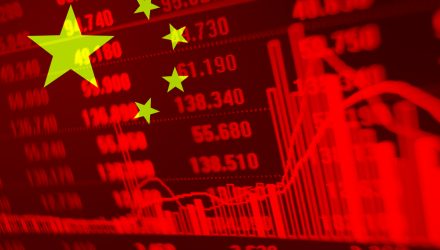After being in the eye of the coronavirus pandemic storm, China is charging ahead with a vaunted rebound after the country’s GDP grew by 3.2% in the second quarter of this year, which beat analysts’ expectations following a first-quarter contraction. This will certainly put China-focused exchange-traded funds (ETFs) in play as the economy continues to forge on past the effects of the virus.
“Economists polled by Reuters expected gross domestic product to have grown modestly at 2.5% in the April to June quarter,” a CNBC report noted. “China’s first quarter GDP contracted by 6.8% in 2020 from a year ago as the world’s second largest economy took a huge hit from the coronavirus outbreak. This was the country’s first GDP decline since at least 1992 when official quarterly records started.”
“Generally speaking, the national economy overcame the adverse impact of the epidemic in the first half gradually and demonstrated a momentum of restorative growth and gradual recovery, further manifesting its development resilience and vitality,” said China’s National Bureau of Statistics in a press release on Thursday.
For China exposure, one fund to consider is the iShares MSCI China ETF (NasdaqGM: MCHI), which seeks to track the investment results of the MSCI China Index. The index is a free float-adjusted market capitalization-weighted index designed to measure the performance of equity securities in the top 85% in market capitalization of the Chinese equity securities markets, as represented by the H-shares and B-shares markets.
“Given the continuous spread of the epidemic globally, the evolving huge impact of the epidemic on the global economy and the noticeably mounting external risks and challenges, the national economic recovery was still under pressure,” said China’s statistic bureau.
Broad Exposure to EM
When looking for more broad exposure to emerging markets versus single country exposure, one fund to consider for broad-based emerging markets exposure, but with less volatility risk is the FlexShares Emerging Markets Quality Low Volatility Index Fund (QLVE). QLVE seeks investment results that correspond generally to the price and yield performance, before fees and expenses, of the Northern Trust Emerging Markets Quality Low Volatility IndexSM.
The underlying index is designed to reflect the performance of a selection of companies that, in aggregate, possess lower overall absolute volatility characteristics relative to a broad universe of securities domiciled in emerging market countries. Under normal circumstances, the fund will invest at least 80% of its total assets in the securities of the underlying index and in ADRs and GDRs based on the securities in the underlying index.
For more market trends, visit ETF Trends.


